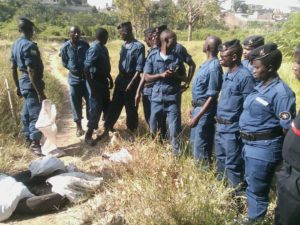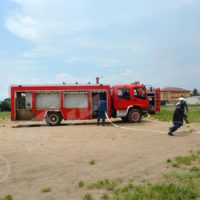The training seeks to prevent potential devastating incidents in country that is at high risks of accidental explosions, according to the Mines Advisory Group (MAG).

The trainees getting ready to practice the disposal of explosives.
Until last week Burundi police had only three officers qualified to dispose of explosives. Eleven new officers of the civil protection police received a five-day training in destroying excess, obsolete and unserviceable ammunitions from Monday.
Antoine Ntemako, the Director General of the civil protection police, says the police seek to promote self-reliance in dealing with the explosives such as the unexploded left over from the civil war.
The practical part of the training took place on Thursday afternoon. The officers practiced what they had learned by disposing of grenades and mortar bombs in the valley of Ntahangwa River in Bujumbura city.
Ntemako says that, though the 11 new trainees have acquired only basic skills, they will strengthen the existing team of three experts.
“The three had to travel around the country to destroy unexploded explosive devices that are found throughout the territory due to the civil war the country has gone through,” he says. “We have to be able to carry out the operations ourselves without turning to foreigners”, adds Ntemako.
Oswald Gasore, the trainer and one of the three national experts, says the trainees will transmit the new skills to other officers. “As they have just proved, they are now able to carry out operations of explosive device destruction”, says Gasore. “They will transmit the new knowledge to others.”
The trainees also learned about ammunition stock control.
Ntemako says the police have decided to build capacity for its troops as a strategy to prevent disasters such as what happened in Congo Brazzaville in 2012. A series of accidental explosions that occurred in a military camp in Brazzaville, the capital, killed at least 300 people, while over 2,500 were injured. Homes of 13,854 were destroyed in the incident.
The Geneva International Centre for Humanitarian De-mining (GICHD) conducted a case study on Burundi in September 2012. GICHD observed that a similar accident could happen in the country.
“While Burundi has not yet experienced a serious explosion, unsuitable conditions for handling and storage, coupled with the volatile stocks of conventional ammunitions and explosives, pose a serious threat to civilians, especially since many deposits are located in densely populated areas.”, reads the study report.
According to the report, MAG estimated it urgent to destroy excess, obsolete and unserviceable ammunitions and train the army and the police in safe management of arms and ammunitions.



















 IWACU Open Data
IWACU Open Data

